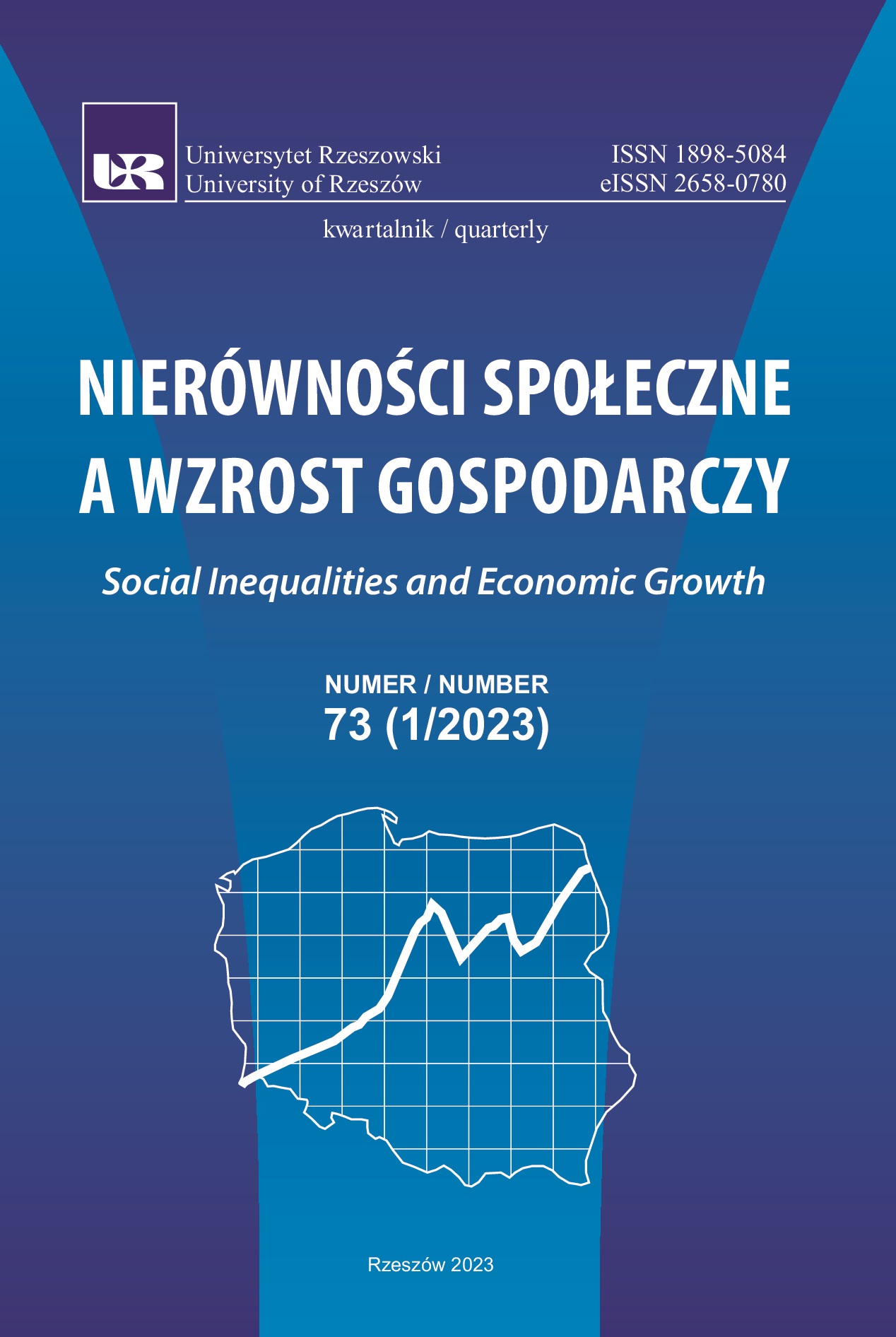Inequalities as an element of economic pragmatism
DOI:
https://doi.org/10.15584/nsawg.2023.1.3Keywords:
income inequality, wealth inequality, economic developmentAbstract
Inequality is a problem that affects virtually the entire modern world. The author reminds us that in 2000, the UN adopted the Millennium Development Goals (MDGs) and then, in 2015, specified the Sustainable Development Goals (SDGs) to guide the world’s development in order to close the gaps between and within countries.
The author discusses the most important conclusions on the effects of inequality from the work of the Joseph E. Stiglitz, Amartya Sen and Jean-Paul Fitoussi Commission, the works of Stiglitz and Piketty. He points out that income and wealth inequalities began to grow in the US and European countries from the early 1980s, when the expansion of neoliberal ideology took place and countries began to withdraw tax progression mechanisms in tax policy. These inequalities are therefore not natural, as conservatives believe, they stem from ideology – and here he agrees with Piketty.
However, he points out that it does not mean that inequality should be abolished altogether and be replaced by equality, as he argues that the level of inequality should stabilise at some level resulting from a certain rationality. He shows that certain principles of inequality are universal and have been applied since antiquity, and advocates for principles of inequality pragmatism. The need is not for an equality of income and asset status but for the chances of each person being at an appropriate level within pragmatic, rational and just rules of inequality. He points out that it is through inequality that the natural world develops and, in fact, inequality needs the economy both at national and global levels, as it is needed for creative development. The author urges: Let us therefore seek rational rules of inequality.
Downloads
References
Balestra, C., Tonkin, R. (2018). Inequalities in household wealth across OECD Countries: Evidence from OECD Wealth Distribution Database. OECD Statistics Working Papers, 1, 1–69. DOI: 10.1787/7e1bf673-en.
Dobija, M., Kurek, B. (2009). Istota pracy w fizyce i rachunkowości. Zeszyty Naukowe Uniwersytetu Ekonomicznego w Krakowie, 796, 33–45.
Dobija, M. (2016). Ekonomia pracy, godziwych wynagrodzeń i racjonalnych nierówności – laboryzm. Nierówności Społeczne a Wzrost Gospodarczy, 47, 25–52.
Dobija, M., Renkas, J. (2021). The thermodynamic principles as the theoretical basis of fair remuneration. International Journal of Physical Research, 9(1), 1–6. DOI: 10.14419/ijpr.v9i1.31247.
Ferguson, N. (2008). Potęga pieniądza Finansowa historia świata. Warszawa: Wydawnictwo Literackie.
Goldman Recruitment Salary Survey 2022. Pobrane z: www.goldmanrecruitment.pl (2023.02.23).
http//:piketty.pse.ens.fr/ideologie (2023.02.23).
Ksenofont (2021). Wyprawa Cyrusa. Warszawa: Czytelnik.
Piketty, T. (2022a). Kapitał i ideologia. Warszawa: Wydawnictwo Krytyki Politycznej.
Piketty T. (2022b). Krótka Historia Nierówności. Warszawa: Wydawnictwo Krytyki Politycznej.
Polacy praktycznie nie mają oszczędności. Ciekawe wyniki badania – rp.pl, publikacja: 04.08.2022. Pobrane z: https://pieniadze.rp.pl/budzet-rodzinny/art36811451-polacy-praktycznie-nie-maja-oszczednosci-ciekawe-wyniki-badania (2023.02.23).
Renkas, J. (2022). Termodynamiczny model pomiaru kapitału ludzkiego w zastosowaniach do kształtowania wynagrodzeń za pracę. Warszawa: Difin.
Stiglitz, J.E. (2015). Cena nierówności. W jaki sposób dzisiejsze podziały społeczne zagrażają naszej przyszłości? Warszawa: Wydawnictwo Krytyki Politycznej.
Stiglitz, J.E., Fitoussi, J.-P., Durand, M. (2019). Poza PKB – Mierzmy to, co ma znaczenie dla rozwoju społeczno-gospodarczego. Warszawa: OECD, PTE.
Therborn, G. (2015). Nierówność, która zabija Jak globalny wzrost nierówności niszczy życie milionów i jak z tym walczyć. Warszawa: PWN.
Veblen, T. (2013). Teoria klasy próżniaczej. Warszawa: Wydawnictwo Muza.
Żyżyński, J. (2009). Budżet i polityka podatkowa. Warszawa: PWN.
Żyżyński, J. (2020). Salaries and the logic of national income distribution in a market economy – described using a simple mode. Nierówności Społeczne a Wzrost Gospodarczy, 63(3), 69–112. DOI: 10.15584/nsawg.2020.3.4.
Żyżyński, J. (2018). Zależność dochodów budżetowych od stopy podatkowej w kontekście teorii Laffera jako hipotezy behawioralnej. W: A.Z. Nowak, B. Glinka (red.), Procesy zarządzania w globalizującej się gospodarce (s. 169–184). Warszawa: Wydawnictwo Naukowe WZ UW.
Downloads
Published
How to Cite
Issue
Section
License
Copyright (c) 2023 University of Rzeszow

This work is licensed under a Creative Commons Attribution-ShareAlike 4.0 International License.


